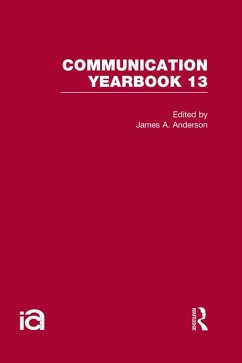Communication Yearbook 13 (eBook, PDF)
Redaktion: Anderson, James
46,95 €
46,95 €
inkl. MwSt.
Sofort per Download lieferbar

23 °P sammeln
46,95 €
Als Download kaufen

46,95 €
inkl. MwSt.
Sofort per Download lieferbar

23 °P sammeln
Jetzt verschenken
Alle Infos zum eBook verschenken
46,95 €
inkl. MwSt.
Sofort per Download lieferbar
Alle Infos zum eBook verschenken

23 °P sammeln
Communication Yearbook 13 (eBook, PDF)
Redaktion: Anderson, James
- Format: PDF
- Merkliste
- Auf die Merkliste
- Bewerten Bewerten
- Teilen
- Produkt teilen
- Produkterinnerung
- Produkterinnerung

Bitte loggen Sie sich zunächst in Ihr Kundenkonto ein oder registrieren Sie sich bei
bücher.de, um das eBook-Abo tolino select nutzen zu können.
Hier können Sie sich einloggen
Hier können Sie sich einloggen
Sie sind bereits eingeloggt. Klicken Sie auf 2. tolino select Abo, um fortzufahren.

Bitte loggen Sie sich zunächst in Ihr Kundenkonto ein oder registrieren Sie sich bei bücher.de, um das eBook-Abo tolino select nutzen zu können.
The Communication Yearbook 13 includes chapters on the following topics: Interaction goals in negotiation, an analysis of ethnographic narrative, the role of the news media in international relations, Japan as an information exporter, group decision making, new models for mass communication research.
- Geräte: PC
- mit Kopierschutz
- eBook Hilfe
- Größe: 10.79MB
Andere Kunden interessierten sich auch für
![Communication Yearbook 11 (eBook, PDF) Communication Yearbook 11 (eBook, PDF)]() Communication Yearbook 11 (eBook, PDF)47,95 €
Communication Yearbook 11 (eBook, PDF)47,95 €![Communication Yearbook 36 (eBook, PDF) Communication Yearbook 36 (eBook, PDF)]() Communication Yearbook 36 (eBook, PDF)47,95 €
Communication Yearbook 36 (eBook, PDF)47,95 €![Communication Yearbook 7 (eBook, PDF) Communication Yearbook 7 (eBook, PDF)]() Communication Yearbook 7 (eBook, PDF)47,95 €
Communication Yearbook 7 (eBook, PDF)47,95 €![Communication Yearbook 20 (eBook, PDF) Communication Yearbook 20 (eBook, PDF)]() Communication Yearbook 20 (eBook, PDF)47,95 €
Communication Yearbook 20 (eBook, PDF)47,95 €![Communication Yearbook 35 (eBook, PDF) Communication Yearbook 35 (eBook, PDF)]() Communication Yearbook 35 (eBook, PDF)48,95 €
Communication Yearbook 35 (eBook, PDF)48,95 €![Communication Yearbook 22 (eBook, PDF) Communication Yearbook 22 (eBook, PDF)]() Communication Yearbook 22 (eBook, PDF)48,95 €
Communication Yearbook 22 (eBook, PDF)48,95 €![Communication Yearbook 18 (eBook, PDF) Communication Yearbook 18 (eBook, PDF)]() Communication Yearbook 18 (eBook, PDF)44,95 €
Communication Yearbook 18 (eBook, PDF)44,95 €-
-
-
The Communication Yearbook 13 includes chapters on the following topics: Interaction goals in negotiation, an analysis of ethnographic narrative, the role of the news media in international relations, Japan as an information exporter, group decision making, new models for mass communication research.
Dieser Download kann aus rechtlichen Gründen nur mit Rechnungsadresse in A, B, BG, CY, CZ, D, DK, EW, E, FIN, F, GR, HR, H, IRL, I, LT, L, LR, M, NL, PL, P, R, S, SLO, SK ausgeliefert werden.
Produktdetails
- Produktdetails
- Verlag: Taylor & Francis eBooks
- Seitenzahl: 592
- Erscheinungstermin: 23. Mai 2012
- Englisch
- ISBN-13: 9781135148386
- Artikelnr.: 38246615
- Verlag: Taylor & Francis eBooks
- Seitenzahl: 592
- Erscheinungstermin: 23. Mai 2012
- Englisch
- ISBN-13: 9781135148386
- Artikelnr.: 38246615
- Herstellerkennzeichnung Die Herstellerinformationen sind derzeit nicht verfügbar.
James Anderson
Section 1: Organizations: Criticism and Culture 1. Power, Discourse, and
the Workplace: Reclaiming the Critical Tradition Stanley Deetz and Dennis
K. Mumby Commentaries: Discourse, Ideology, and Organizational Control
Beth Haslett Absence as Workplace Control: A Critical Inquiry Cynthia Stohl
and Patty Sotirin 2. A Theatre of Motives and the "Meaningful Orders of
Persons and Things" H. L. Goodhall, Jr. Commentaries: Rhetoric and the
Display of Organizational Ethnographies Charles Conrad A View from Within:
An insider's Reflection on the Effect of Relocation Sandra Sanford 3.
Managing Organizational Culture: Dreams and Possibilities Sonja A. Sackmann
Commentaries: Trade-Offs in Managing Organizational Culture Connie J.G.
Gersick More Thought Provoking Than a New Paradigm Larry E. Greiner 4.
Defining Stories in Organizations: Characteristics and Functions Mary Helen
Brown Commentaries Stories as Repositories of Organizational Intelligence:
Implications for Organizational Development Gary L. Kreps Symbolic
Emancipation in the Organization: A Case of Shifting Power Jill J. McMillan
Section 2: Interpersonal Conversations, Arguments, Embarrassments, and
Negotiations 5. Orienting to the Phenomenon Wayne A. Beach Commentaries:
Describing Speech Phenomena Robert Hopper Communication Phenomena as
Solutions to Interactional Problems Jenny Mandelbaum 6. Perspectives on
Group Argument: A Critical Review of Persuasive Arguments Theory and an
Alternative Structurational View Renee A. Meyers and David R. Seibold
Commentaries: Group Argument, Social Pressure, and the Making of Group
Decisions Franklin J. Boster Exploiting the Predictive Potential of
Structuration Theory Dennis S. Gournan 7. Remedial Processes in
Embarrassing Predicaments William R. Cupach and Sandra Metts Commentaries:
Coping with Embarrassment and Chronic Blushing Robert J. Edelmann The Use
of a Communication Boundary Perspective to Contextualize Embarrassment
Research Sandra Petronio 8. Interaction Goals in Negotiation Steven R.
Wilson and Linda L. Putnam Commentaries: The Structure of Interaction Goals
Pamela J. Benoit Interaction Goals in Negotiation: A Critique William A.
Donohue Section 3. Mediated Communication: Information, Industry, and
Consumption 9. The Trade Winds Change: Japan's Shift from an Information
Importer to an Information Exporter, 1965-1985 Youichi Ito Commentaries:
The Competitive Theory of International Communication Majid Tehranian News
Media: Frontiers in International Relations Jaswant S. Yadava 10. Media
Industries, Media Consequences: Rethinking Mass Communication Joseph Turow
Commentaries: Organizational Communication, Media Industires, and Mass
Communication Charles R. Bantz Research from Start to Finish Sandra Barman
and Akiba A. Cohen 11. Textual Status, the Stigmatized Self, and Media
Consumption Virginia H. Fry, Alison Alexander and Donald L. Fry
Commentaries: Finding New Models for Mass Communication Research: Notes on
Surviving Ferment in the Field Dennis K. Davis Toward an Integration of
Diverse Communication Contexts Stuart J. Sigman
the Workplace: Reclaiming the Critical Tradition Stanley Deetz and Dennis
K. Mumby Commentaries: Discourse, Ideology, and Organizational Control
Beth Haslett Absence as Workplace Control: A Critical Inquiry Cynthia Stohl
and Patty Sotirin 2. A Theatre of Motives and the "Meaningful Orders of
Persons and Things" H. L. Goodhall, Jr. Commentaries: Rhetoric and the
Display of Organizational Ethnographies Charles Conrad A View from Within:
An insider's Reflection on the Effect of Relocation Sandra Sanford 3.
Managing Organizational Culture: Dreams and Possibilities Sonja A. Sackmann
Commentaries: Trade-Offs in Managing Organizational Culture Connie J.G.
Gersick More Thought Provoking Than a New Paradigm Larry E. Greiner 4.
Defining Stories in Organizations: Characteristics and Functions Mary Helen
Brown Commentaries Stories as Repositories of Organizational Intelligence:
Implications for Organizational Development Gary L. Kreps Symbolic
Emancipation in the Organization: A Case of Shifting Power Jill J. McMillan
Section 2: Interpersonal Conversations, Arguments, Embarrassments, and
Negotiations 5. Orienting to the Phenomenon Wayne A. Beach Commentaries:
Describing Speech Phenomena Robert Hopper Communication Phenomena as
Solutions to Interactional Problems Jenny Mandelbaum 6. Perspectives on
Group Argument: A Critical Review of Persuasive Arguments Theory and an
Alternative Structurational View Renee A. Meyers and David R. Seibold
Commentaries: Group Argument, Social Pressure, and the Making of Group
Decisions Franklin J. Boster Exploiting the Predictive Potential of
Structuration Theory Dennis S. Gournan 7. Remedial Processes in
Embarrassing Predicaments William R. Cupach and Sandra Metts Commentaries:
Coping with Embarrassment and Chronic Blushing Robert J. Edelmann The Use
of a Communication Boundary Perspective to Contextualize Embarrassment
Research Sandra Petronio 8. Interaction Goals in Negotiation Steven R.
Wilson and Linda L. Putnam Commentaries: The Structure of Interaction Goals
Pamela J. Benoit Interaction Goals in Negotiation: A Critique William A.
Donohue Section 3. Mediated Communication: Information, Industry, and
Consumption 9. The Trade Winds Change: Japan's Shift from an Information
Importer to an Information Exporter, 1965-1985 Youichi Ito Commentaries:
The Competitive Theory of International Communication Majid Tehranian News
Media: Frontiers in International Relations Jaswant S. Yadava 10. Media
Industries, Media Consequences: Rethinking Mass Communication Joseph Turow
Commentaries: Organizational Communication, Media Industires, and Mass
Communication Charles R. Bantz Research from Start to Finish Sandra Barman
and Akiba A. Cohen 11. Textual Status, the Stigmatized Self, and Media
Consumption Virginia H. Fry, Alison Alexander and Donald L. Fry
Commentaries: Finding New Models for Mass Communication Research: Notes on
Surviving Ferment in the Field Dennis K. Davis Toward an Integration of
Diverse Communication Contexts Stuart J. Sigman
Section 1: Organizations: Criticism and Culture 1. Power, Discourse, and
the Workplace: Reclaiming the Critical Tradition Stanley Deetz and Dennis
K. Mumby Commentaries: Discourse, Ideology, and Organizational Control
Beth Haslett Absence as Workplace Control: A Critical Inquiry Cynthia Stohl
and Patty Sotirin 2. A Theatre of Motives and the "Meaningful Orders of
Persons and Things" H. L. Goodhall, Jr. Commentaries: Rhetoric and the
Display of Organizational Ethnographies Charles Conrad A View from Within:
An insider's Reflection on the Effect of Relocation Sandra Sanford 3.
Managing Organizational Culture: Dreams and Possibilities Sonja A. Sackmann
Commentaries: Trade-Offs in Managing Organizational Culture Connie J.G.
Gersick More Thought Provoking Than a New Paradigm Larry E. Greiner 4.
Defining Stories in Organizations: Characteristics and Functions Mary Helen
Brown Commentaries Stories as Repositories of Organizational Intelligence:
Implications for Organizational Development Gary L. Kreps Symbolic
Emancipation in the Organization: A Case of Shifting Power Jill J. McMillan
Section 2: Interpersonal Conversations, Arguments, Embarrassments, and
Negotiations 5. Orienting to the Phenomenon Wayne A. Beach Commentaries:
Describing Speech Phenomena Robert Hopper Communication Phenomena as
Solutions to Interactional Problems Jenny Mandelbaum 6. Perspectives on
Group Argument: A Critical Review of Persuasive Arguments Theory and an
Alternative Structurational View Renee A. Meyers and David R. Seibold
Commentaries: Group Argument, Social Pressure, and the Making of Group
Decisions Franklin J. Boster Exploiting the Predictive Potential of
Structuration Theory Dennis S. Gournan 7. Remedial Processes in
Embarrassing Predicaments William R. Cupach and Sandra Metts Commentaries:
Coping with Embarrassment and Chronic Blushing Robert J. Edelmann The Use
of a Communication Boundary Perspective to Contextualize Embarrassment
Research Sandra Petronio 8. Interaction Goals in Negotiation Steven R.
Wilson and Linda L. Putnam Commentaries: The Structure of Interaction Goals
Pamela J. Benoit Interaction Goals in Negotiation: A Critique William A.
Donohue Section 3. Mediated Communication: Information, Industry, and
Consumption 9. The Trade Winds Change: Japan's Shift from an Information
Importer to an Information Exporter, 1965-1985 Youichi Ito Commentaries:
The Competitive Theory of International Communication Majid Tehranian News
Media: Frontiers in International Relations Jaswant S. Yadava 10. Media
Industries, Media Consequences: Rethinking Mass Communication Joseph Turow
Commentaries: Organizational Communication, Media Industires, and Mass
Communication Charles R. Bantz Research from Start to Finish Sandra Barman
and Akiba A. Cohen 11. Textual Status, the Stigmatized Self, and Media
Consumption Virginia H. Fry, Alison Alexander and Donald L. Fry
Commentaries: Finding New Models for Mass Communication Research: Notes on
Surviving Ferment in the Field Dennis K. Davis Toward an Integration of
Diverse Communication Contexts Stuart J. Sigman
the Workplace: Reclaiming the Critical Tradition Stanley Deetz and Dennis
K. Mumby Commentaries: Discourse, Ideology, and Organizational Control
Beth Haslett Absence as Workplace Control: A Critical Inquiry Cynthia Stohl
and Patty Sotirin 2. A Theatre of Motives and the "Meaningful Orders of
Persons and Things" H. L. Goodhall, Jr. Commentaries: Rhetoric and the
Display of Organizational Ethnographies Charles Conrad A View from Within:
An insider's Reflection on the Effect of Relocation Sandra Sanford 3.
Managing Organizational Culture: Dreams and Possibilities Sonja A. Sackmann
Commentaries: Trade-Offs in Managing Organizational Culture Connie J.G.
Gersick More Thought Provoking Than a New Paradigm Larry E. Greiner 4.
Defining Stories in Organizations: Characteristics and Functions Mary Helen
Brown Commentaries Stories as Repositories of Organizational Intelligence:
Implications for Organizational Development Gary L. Kreps Symbolic
Emancipation in the Organization: A Case of Shifting Power Jill J. McMillan
Section 2: Interpersonal Conversations, Arguments, Embarrassments, and
Negotiations 5. Orienting to the Phenomenon Wayne A. Beach Commentaries:
Describing Speech Phenomena Robert Hopper Communication Phenomena as
Solutions to Interactional Problems Jenny Mandelbaum 6. Perspectives on
Group Argument: A Critical Review of Persuasive Arguments Theory and an
Alternative Structurational View Renee A. Meyers and David R. Seibold
Commentaries: Group Argument, Social Pressure, and the Making of Group
Decisions Franklin J. Boster Exploiting the Predictive Potential of
Structuration Theory Dennis S. Gournan 7. Remedial Processes in
Embarrassing Predicaments William R. Cupach and Sandra Metts Commentaries:
Coping with Embarrassment and Chronic Blushing Robert J. Edelmann The Use
of a Communication Boundary Perspective to Contextualize Embarrassment
Research Sandra Petronio 8. Interaction Goals in Negotiation Steven R.
Wilson and Linda L. Putnam Commentaries: The Structure of Interaction Goals
Pamela J. Benoit Interaction Goals in Negotiation: A Critique William A.
Donohue Section 3. Mediated Communication: Information, Industry, and
Consumption 9. The Trade Winds Change: Japan's Shift from an Information
Importer to an Information Exporter, 1965-1985 Youichi Ito Commentaries:
The Competitive Theory of International Communication Majid Tehranian News
Media: Frontiers in International Relations Jaswant S. Yadava 10. Media
Industries, Media Consequences: Rethinking Mass Communication Joseph Turow
Commentaries: Organizational Communication, Media Industires, and Mass
Communication Charles R. Bantz Research from Start to Finish Sandra Barman
and Akiba A. Cohen 11. Textual Status, the Stigmatized Self, and Media
Consumption Virginia H. Fry, Alison Alexander and Donald L. Fry
Commentaries: Finding New Models for Mass Communication Research: Notes on
Surviving Ferment in the Field Dennis K. Davis Toward an Integration of
Diverse Communication Contexts Stuart J. Sigman







